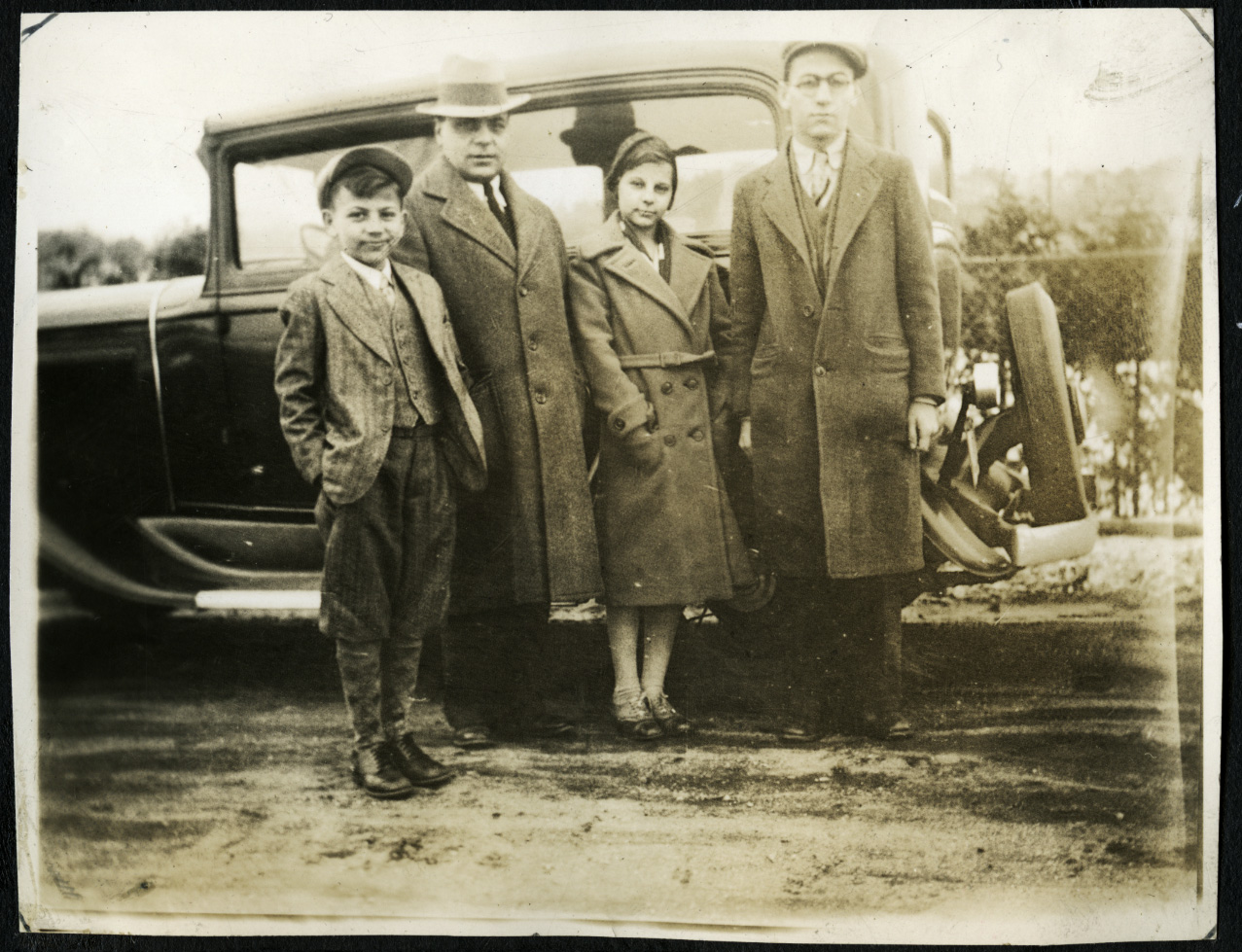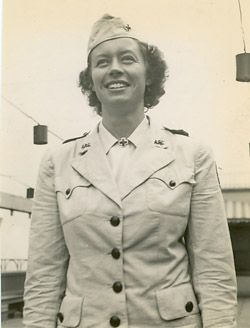Polish Soldiers Relief Correspondence
Four postcards sent to Polish Soldiers Relief of Chicopee in 1941 concerning Polish prisoners of war in German camps.
Four postcards sent to Polish Soldiers Relief of Chicopee in 1941 concerning Polish prisoners of war in German camps.

When Antonio Politella emigrated from Italy to Lawrence, Mass., in 1910, he joined an older half-brother Walter Pollano, but left behind his wife and infant son. Working as a pharmacist under Pollano, Politella was successful enough to reunite his family in 1919, and eventually raised a family of three, all of whom went on to earn undergraduate degrees at Massachusetts State College and dedicate their lives to education. The eldest child, Joseph (’33), served in the Army Air Corps during the Second World War, earned a PhD in philosophy at the University of Pennsylvania, and taught in eastern religions at Kent State University. Lillian (’42) became a French teacher, while Dario (’47), an aviator during the war, earned his doctorate at Syracuse and taught journalism at UMass Amherst for many years.
The Politella family collection contains correspondence received primarily by Lillian Politella (’42), the bulk of which reflects the impact on the war on both her family and college. Among the letters are dozens written by her brothers Joseph (’33) and Dario (’47) and friend Donald W. Cadigan (’39) while in the service, which are joined by an evocative series from their teacher and mentor, Ray Ethan Torrey. Torrey’s letters in particular offer insight into Mass. State College during and after the war and are replete with news about acquaintances and complaints about liberals and current events.
Founded and chaired by Norman Thomas in 1942, the Post-War World Council sought to lay the groundwork for a democratic and anti-imperialist end to the Second World War. As the face of the organization, Thomas promoted the pacifist ideals of internationalism, disarmament, and decolonization, however his failing health in the early 1960s led to the decline of the Council and its formal dissolution in 1967.
This collection consists of pamphlets from the Post War World Council that document a range of opinions concerning the war and the world, including titles such as “Saboteurs of Victory,” “The Case Against Compulsory Peacetime Military Training,” “The Future of the Far East,” and “Disarmament in the Post War World.”
Howard Henri Quint was born in New Haven, Connecticut in January 1917. He received his PhD in History from Johns Hopkins University in 1947. During the war years (1942-1946) Dr. Quint served as Propaganda Analyst for the Foreign Broadcast Intelligence Service, as Political Analyst for the Office of the Coordinator of Inter-American Affairs, and as Political and Economic Analyst for the Office of Strategic Services.In 1959 he accepted a professorship at the University of Massachusetts Amherst. Upon his return from a Fulbright in Italy in 1962, Quint was selected as Chair of the History Department, a position he retained until 1968. While serving as Chair, Dr. Quint was instrumental in initiating the PhD program in History and was responsible for establishing the Honors Program at the University of Massachusetts. After stepping down from his position as Department Chair in 1968, Dr. Quint continued to be a Professor of History at the University of Massachusetts until his death in June 1981.
The papers of Howard H. Quint document his distinguished career as professor, author, and Chair of the History Department at the University of Massachusetts at Amherst. They consist of biographical materials; general correspondence (largely professional); research and other materials related to the writing and publishing of five books; lecture notes, syllabi and other course-related materials; note cards and annotated typescripts; articles, book reviews, and academic conference materials; travel documents; materials related to honors programs; and materials related to international scholar exchange programs. The bulk of the papers were generated between 1955 and 1968.
Born in Germany in 1888, Henry Gustave Reinsch became an American citizen in 1912, serving in the military during the First World War, marrying an American girl, and starting a family. In 1942, however, two FBI agents showed up at Reinsch’s office, and a year later, Reinsch’s citizenship was revoked when he was accused by the U.S. government of living a double life — publicly loyal to America, privately loyal to Germany. Reinsch appealed the ruling to the Ninth Circuit Court and won. His citizenship was reinstated in 1945.
The Reinsch Papers contains newspaper clippings, personal and business correspondence, and official documents pertaining to both citizenship trials, that tell of uncommon wartime experiences.

Maida Leonard Riggs, class of 1936, taught women’s physical education at UMass before shifting to teacher preparation. Riggs was a beloved member of the UMass faculty for 28 years before her retirement. An adventurous spirit took Riggs around the globe: to Europe with the Red Cross during World War II; as a bicycling tour leader after the war; on a trek across Nepal at age 62; to Russia, China, Japan, Australia, New Zealand, and Uzbekistan. After retiring, Riggs, a self-described compulsive traveler, embarked on a more personal journey to explore her roots. Riggs transcribed more than 250 letters by her pioneer great-grandmother, Mary Ann Clark Longley, and published them under the title A Small Bit of Bread and Butter: Letters from the Dakota Territory, 1832-1869, an absorbing and sometimes heartbreaking account of life on the frontier. An avid photographer, Riggs took advantage of any opportunity to use her camera. These images, particularly from World War II, tell as many stories as do her correspondence. Her memoir, Dancing in Paratrooper Boots, contains typed copies of her letters from her days as a Red Cross volunteer during the war.
The Riggs Papers are a rich documentary history of the World War II era, both in America and Europe, as well as an engrossing study (in transcripts) of the American frontier. Included with extensive correspondence and photographs are published and unpublished prose, and Lovingly, Lucy: Vignettes of a Pioneer Woman’s Life, an essay on Riggs’s paternal grandmother, Lucy Dodge Riggs. Additional items in the collection include handwritten journals, one detailing a trip to China and Japan in 1982, and Riggs’s photographs of young children at play taken for her book on child development, Jump to Joy: Helping Children Grow Through Active Play. Riggs also took her genealogical research seriously, meticulously charting her family’s 1638 immigration from England to Massachusetts. With camera in hand, she later traveled to England in search of more evidence of the Longleys’ English roots.
A political scientist, writer, and government consultant, John P. Roche was born in Brooklyn, N.Y., on May 7, 1923, the son of a salesman. A liberal Social Democrat and fervent anti-Communist, Roche spent his academic career at Haverford College and Brandeis and Tufts Universities, writing extensively on American foreign policy, constitutional law, and the history of political thought in America, and maintaining a strong interest in the history of the American left. During the 1960s and early 1970s, he served as an adviser to the Kennedy, Johnson, and Nixon administrations.
The Roche Collection consists of over 300 publications pertaining to the political left in the United States, with a smaller number of works from the radical right and from European Socialists and Communists. Concentrated in the years spanning the Great Depression, the Second World War, and the McCarthy hearings, many of the works were produced by formal political parties in response to particular political campaigns, current events, or social issues, with other works geared primarily toward consciousness raising and general political education on trade unionism, fascism, war and peace, American foreign policy, and freedom of speech and the press.
Courier for the underground in Nazi occupied Poland during the 1944 Warsaw Uprising who was apprehended and placed in a concentration camp. After the war she and her husband moved from England to Holyoke, Massachusetts. Includes typescripts and photocopies of short stories; “Ameryce”, a booklet of poems; Poklosie, a book of poems published in Polish and English (Artex Press, 1987); audiotaped oral histories of Leokadia and Stanley Rowinski (primarily in Polish) done by their children; and photographs, audiotape, program and text of poems read at a public reading.
Robert and Waldemar Schultze were brothers from Buffalo, New York, held in disciplinary army barracks because of their status as conscientious objectors during the Second World War. Both Robert and Waldemar wrote to their mother, Jennie Schultze, frequently, and she to them. The collection contains roughly 120 letters, almost all of them dated, spanning mainly from 1943 to 1944. Robert, the younger of the two Schultze boys, also wrote to his fiancee Helen Anne Rosen.
The letters concern everything from the family dog to the family business. Due to strictly enforced censorship, the brother’s were cautious in the official letters home to their mother. Waldemar and Robert were able to sneak a handful of letters out of prison to their mother, however, and in those letters they wrote honestly about the conditions they encountered. In one such letter, Waldemar wrote his mother and told her about the threat of postponing his good behavior release date if he should slip up and write something that had to be censored, or even if she wrote something to him that needed to be censored. A small amount of correspondence exists that is addressed to Jennie from Attorneys J. Barnsdall and J. Cornell, regarding Robert and Waldemar’s case.
Historian, author, Professor of Russian and Soviet Jewish History at Rutgers University, who helped arrange the escape of Jews from Europe during World War II and was active in several organizations concerned with the emigration of Soviet and Eastern European Jews to Palestine. Papers include biographical materials, correspondence, legal documents, writings, lecture and research materials, statistical data in the world Jewish population before and after World War II, oral history transcripts, pamphlets, newspaper clippings, and four photographs.